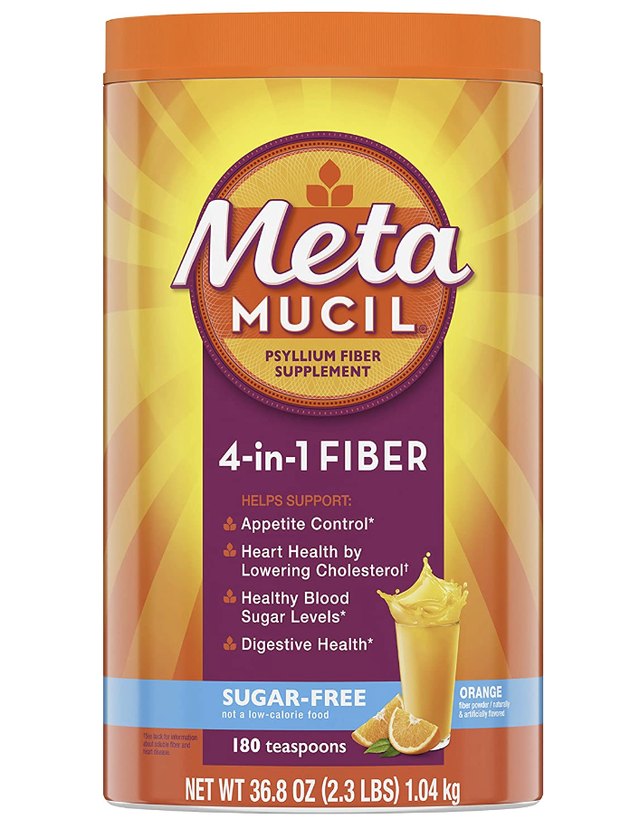
Psyllium — a natural element that is rich in soluble fiber — is often used as a gentle laxative.
Psyllium husk in particular, from the plant Plantago ovata, is a laxative ingredient used in products like Metamucil, per Mount Sinai.
Video of the Day
Video of the Day
While fiber like psyllium is a helpful tool when dealing with chronic constipation, high cholesterol, diabetes and other conditions, it's not recommended for so-called "colon cleanses" or "detoxes".
In fact, your body naturally does a pretty good job at removing waste and toxins on its own, and there's no scientific evidence to support the benefits of colon cleanses, per the Mayo Clinic.
One of the only reasons you may need to do a colon cleanse is if it's prescribed by your doctor in preparation for an exam like a colonoscopy.
Here, learn how to safely use psyllium husk to relieve constipation, and when you'd actually need a colon cleanse.
Warning
Do not take more psyllium husk than prescribed or recommended on the label.
Stop taking psyllium husk and see your doctor if your constipation has not resolved, or you have abdominal pain, nausea, vomiting or diarrhea.
How Does Psyllium Husk Work?
When psyllium husk is combined with water in your stomach, it bulks up and stimulates your intestines to contract, per Mount Sinai.
This speeds up the movement of stool through your digestive system, helping relieve constipation, per Mount Sinai.
But because psyllium husk is also a good source of soluble fiber, it may be recommended to add to your diet if you have certain health conditions like:
- Diabetes: A high-fiber diet can help manage your blood sugar and your weight, per the Centers for Disease Control and Prevention (CDC).
- Heart disease: Soluble fiber is good for your heart, and may help lower your risk of heart disease, per Harvard Health Publishing.
- High blood pressure: A high-fiber diet may help improve blood pressure levels in people with existing high blood pressure, per Houston Methodist.
- High cholesterol: Soluble fiber can reduce the absorption of cholesterol into your bloodstream, per the Mayo Clinic.
Ultimately, it's best to try eating high-fiber foods first, but if you can't get enough fiber through diet alone, psyllium husk powder (often in the form of Metamucil) can help.
Steps to Safely Use Psyllium Husk
1. Choose the Right Kind for You
Look for over-the-counter products with labels that include "natural fiber psyllium husk" — which is extracted from the seeds of the psyllium plant, per Mount Sinai.
These products may come in powder, granule, capsule, liquid and wafer form.
2. Take Your Medications and Vitamins First
Take any medications, vitamins and supplements you need first thing in the morning. Then, wait about two to three hours before taking psyllium husk so your body has time to fully absorb your medicine, per Harvard Health Publishing.
Psyllium can decrease the absorption of certain medicines and vitamins, which is why you should leave plenty of time between when you take them.
3. Follow the Product Label Directions
Carefully follow the dosage directions on the label. Some may suggest taking it between meals, in the morning before breakfast or before bed.
The best time to take fiber supplements will largely depend on the reason you're taking it.
For constipation, you may need to take psyllium husk one to three times per day, but this may depend on how backed up you are, and what your doctor recommends.
Tip
If you're new to taking psyllium husk powder, start slowly with one serving per day. Then gradually increase your daily intake as needed, per Metamucil's website.
If You're Using Raw Psyllium Husk
- Grind 1 teaspoon of raw psyllium husk in a blender with a little bit of water.
- Mix the powder into an 8-ounce glass of water until it is well mixed.
- Drink the full glass.
- Drink another 1/2 to full cup of plain water to help better absorb psyllium (more on this below).
4. Drink Plenty of Water
While taking psyllium husk, make sure you're still drinking plenty of water.
The recommended daily amount is 11.5 to 15.5 cups per day, through drinking or water-rich foods, per the National Academies of Sciences, Engineering and Medicine.
This is important because psyllium husk draws in a lot of water, which can lead to dehydration and stool that might feel hard or difficult to pass, per the Cleveland Clinic.
Plus, drinking enough water generally helps move waste through your digestive system, per the Mayo Clinic.
Tip
Finding it hard to remember to drink water? Set a reminder on your phone to drink every few hours, and keep a water bottle nearby.
5. Eat a Balanced Diet
One of the best ways to keep your colon healthy is not through purported "colon cleanses," but from eating a wholesome diet rich in fiber and other essential nutrients, per Penn Medicine.
This means it's still important to maintain a nutritious diet while taking psyllium husk products.
Focus on incorporating fruits and vegetables, lean protein (like fish, turkey and chicken), whole grains (like oats and bran) and healthy sources of fat (like avocado and olive oil) to your diet.
And reduce the amount of ultra-processed foods, sugary snacks, baked goods and fried foods you eat, as they can slow down digestion and make constipation worse, per Johns Hopkins Medicine.
An example of a well-balanced meal rich in fiber includes brown rice with black beans, steamed vegetables and a piece of baked fish.
How Long Can You Take Psyllium Husk?
Do not take psyllium husk for longer than a week, unless directed by your doctor. If you still have constipation, talk to your doctor about other treatment options, per the Cleveland Clinic.
6. Keep Exercising
Regular physical activity is important, as it can help move your bowels and reduce constipation, especially in older adults, per Harvard Health Publishing.
If you don't already have a workout routine, try taking brisk walks around the neighborhood, playing a game of tennis or pickleball or riding a bike.
No matter what you choose, aim to get at least 150 minutes of moderate-intensity exercise per week, or about 30 minutes per day, five days per week, according to the CDC.
Who Needs a 'Colon Cleanse?'
"Colon cleanses" or "detoxes" are not recommended for the majority of people, as your body can naturally remove waste and toxins on its own — through your liver, kidneys and colon, per Rush University System for Health.
In fact, your colon in particular is a self-contained, efficient and self-cleaning system that's always removing toxins and waste from your body, per Henry Ford Health.
The only time you would need to cleanse your colon is before you get a colonoscopy — a procedure done to screen for colon cancer.
In that case, your doctor will prescribe a laxative for you to drink several times the day before, to make sure your digestive tract is empty so they can do the procedure, per Henry Ford Health.
Warning
Colon cleanses you try to do at home or get done at a spa may come with the potential for harmful side effects, including dehydration, electrolyte imbalance, elimination of good bacteria in your gut and more, per Henry Ford Health.
The Bottom Line
Psyllium husk is a soluble fiber that can help relieve constipation. It's found in many forms and can be taken several times a day to improve your symptoms.
Just be sure to take it as directed with plenty of water, and alongside other healthy habits like diet and exercise.
Ultimately, it's not advised to take psyllium husk to cleanse your colon. If you have any concerns about your colon health and its functioning, talk to your doctor.
- Mount Sinai: "Psyllium"
- Mayo Clinic: "Is colon cleansing a good way to eliminate toxins from your body?"
- CDC: "Fiber: The Carb That Helps You Manage Diabetes"
- Harvard Health Publishing: "Eat more fiber-rich foods to foster heart health"
- Mayo Clinic: "Cholesterol: Top foods to improve your numbers"
- Houston Methodist: "7 Benefits of Fiber That Should Convince You to Eat Enough of It"
- Harvard Health Publishing: "By the way, doctor: Will a fiber supplement interfere with my medications?"
- National Academies of Sciences, Engineering and Medicine: "Report Sets Dietary Intake Levels for Water, Salt, and Potassium To Maintain Health and Reduce Chronic Disease Risk"
- Mayo Clinic: "Does drinking water during or after a meal affect or disturb digestion?"
- Cleveland Clinic: "Psyllium Powder for Solution"
- Penn Medicine: "Colon Cleansing: Medical Breakthrough or Myth?"
- Johns Hopkins Medicine: "Foods for Constipation"
- Harvard Health Publishing: "Common Causes of Constipation"
- CDC: "How much physical activity do adults need?"
- Rush University System for Health: "The Truth About Toxins"
- Henry Ford Health: "Colon Cleanses: Helpful or Harmful?"
